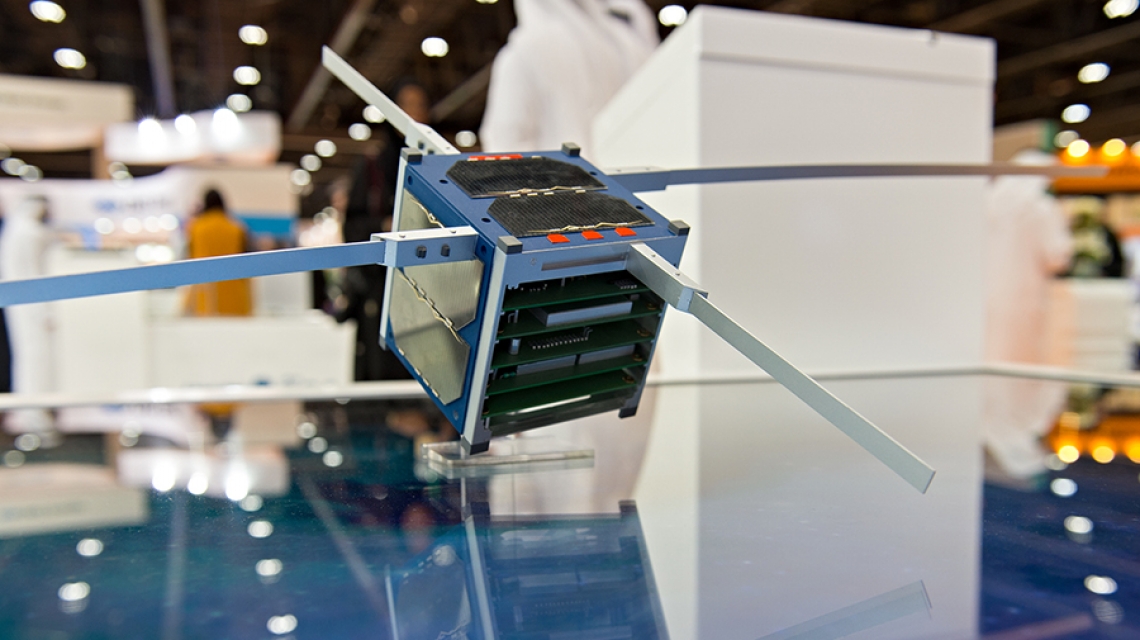
Masdar Institute has announced that its CubeSat development program has completed the preliminary design review (PDR), marking a critical milestone for the Institute’s Space Systems and Technology program, which was designed by Masdar Institute faculty with support from Al Yah Satellite Communications Company (Yahsat) and global aerospace manufacturer and defense industry leader Orbital ATK.
Masdar Institute’s first CubeSat program now has only one more phase to clear before full-scale fabrication of the CubeSat can begin. This final stage, the critical design review (CDR), is scheduled for June 2017.
The development of the Masdar Institute CubeSat program, called MYSAT-1, commenced with the first batch of enrolled students in the Masdar Institute Space Systems and Technology concentration in September 2015. MYSAT-1 will be a one Unit (1U), or 10cmx10cmx10cm, CubeSat built with the main objective of training students on the various aspects of designing, building and operating small satellites. The payloads that will be included in MYSAT-1 are a camera to take pictures of the earth and a battery designed and developed at Masdar Institute. MYSAT-1 is expected to be launched into space in 2018.
Dr. Behjat Al Yousuf, Interim Provost, Masdar Institute, said: “The successful completion of the PDR indicates that the MYSAT-1 Program is on track for orbital launch as scheduled. As the first master’s level concentration in Space Systems and Technology in the Gulf region, the program is setting a precedent for future space systems and technology development in the UAE, and represents a first major contribution of Emirati scientists to the country’s indigenous space technology development.”
Mona Al Muhairi, Chief Human Capital Officer at Yahsat said, “The Preliminary Design Review is an industry standard process where engineers review and confirm the overall architecture of the student’s Cubesat design. The program underpins Yahsat’s legacy by developing future talent, evolving the UAE’s space advancement and heightens our role in the industry. Our ultimate goal is to foster the advanced research areas in space science and technology needed to support the UAE national space program with human resources, technical advancements and infrastructure.”
The PDR demonstrates that the overall program preliminary design meets all requirements with acceptable risk and within the cost and schedule constraints and establishes the basis for proceeding with detailed design. After successfully completing the PDR, students are now able to procure the first set of components needed to build a breadboard model, or initial demonstration, of a mini-satellite and finalize the design.
Building a satellite, even that of the scale of a CubeSat, is challenging, which is why project reviews like the PDR and CDR are in place to ensure that the satellite designs will be able to achieve the mission goals. The MYSAT-1 review panels consist of experienced space professionals from YahSat, Orbital ATK, UAE Space Agency, Mubadala and AGI, who provide a critical review of the students’ work and provide constructive feedback.
“It was important to get the students involved in the review process, as the main goal of MYSAT-1 is to train students on understanding the general system engineering practices in space projects,” said Dr. Prashant Marpu, Assistant Professor of Chemical and Environmental Engineering, who contributed to the development of the Space Systems and Technology program. “Now, these students, who are due to graduate in May 2017, will have the engineering and leadership skills needed to advance the UAE’s satellite and space sector.”
Masdar Institute MSc in Computing and Information Science student Mahool Al Hammadi, who is among the first batch of students enrolled in the Space Systems and Technology concentration scheduled to graduate this May, said: “Joining this program gave me an opportunity to gain real-world knowledge about the space industry. I believe that my participation in the MYSAT-1 project improved my management and engineering skills, which will make me a better computer scientist who can contribute in UAE’s future space missions.”
Erica Solomon
News and Features Writer
16 January 2017